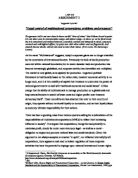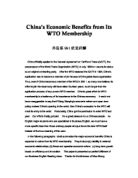From the above systems, WTO has the power over the domestics’ government in some extent. To pass the decision, only two third of vote is required but to stop the decision, unanimous consent is needed. It is not very fair to minority countries. Also, what WTO did is corporate-managed trade, but not free trade, since it produces constraints, not freedom, for the rest of the countries. WTO undermines the ability of national government to set up and enforce the laws. The national government has to pass the law which is in line with the goal of WTO - to promote trade, even at the expense of other important issues. Therefore, the national government would lose the accountability towards its citizens and cannot protect the country from environment, food safety issues, etc.
WTO’s rules are enforced through the dispute settlement system. The system sets up free-standing tribunals and includes a system for resolving cases where one country can challenge any other country’s laws. First, there’s a consultation period in which the county can try to get other county to change their law before a formal case is filed. About 49% of the cases are settled in this stage. Usually, the developing countries just preemptively dump its law even if it has a higher chance of win as they cannot afford to defend the law for a year in Geneva. Even for rich countries, they will dump the law since they know they will lose the case under WTO jurisdiction.
If they cannot resolve the case in this period, then the complaining country would ask for the formation of a panel. The WTO dispute Settlement Understanding sets up the criteria in choosing the panels. The criteria ensure that the judges will have a built-in bias towards maintaining the status-quo system, as well as making sure commercial values triumph over others. However, the criteria do not ensure that there is no conflict of interest in deciding the panels. Also, though these panels are now empowered to judge different trade issues, there is no requirement that there be any but trade expertise on any of the panels. There is no requirement to seek outside expertise neither.
After hearing the case, the tribunal issues a ruling. The ruling is automatically binding unless there's a consensus among all the countries – including the winning country – to stop its adoption. Once it's adopted, there is a period that cannot exceed 15 months during which the country that lost the case must change its law to comply with the orders of the WTO. Trade sanctions are automatically adopted if a country has not changed its laws within a reasonable time period. There is no outside appeal from a WTO decision. There is only an internal appeal to an appellate body whose staff is paid by the WTO.
There are problems in this mechanism. First the power of WTO is over the national governments and other international organization since its judgment is final and cannot appeal in else where. If the rules of WTO have bias or unfairness, no way can the countries do. The fairness of the WTO criteria in choosing the panel is in doubt. Another problem is that the terms in this dispute settlement system seems only favor of rich countries. The whole system just ignores the ability of the countries to go through the system. That would result, the countries that have the money to file win. In fact, half of the cases were brought by US and none by developing countries simply because they did not have to resource to do so. Even the developing countries has the resources to file against developed countries and WTO rules in favor of developing countries, little can these developing countries do to enforce the rules as they simply has no bargaining power to do so or developed countries would complain other issues to WTO which force developing countries to give up due to higher opportunities cost.
Apart from this, there are other examples that show the problem of the WTO mechanism. Technical Barriers to Trade Agreement (TBT) and Sanitary and Phytosanitary Standards (SPS) are two of them. Technical Barriers to Trade Agreement states that country must base its domestic standard on an international standard if such a standard exists. This would imply that countries cannot set their domestic standard higher than the international standard. For example, Canada argued that France cannot ban asbestos because the international standards required a contained use of asbestos instead of an absolute ban. Because those are the international standards, even France think that the stuff kills people, cannot be regulated well, and there is no safe use of it, France would not win in this case. Moreover, base on non-discriminations principle in WTO, countries should treat physically similar products the same no matter where and how to produce them. That means tuna caught in dolphin-safe nets can be treated no differently than tuna caught in nets that ensnare dolphins under the rules of WTO. This may also imply that laws banning trade in goods made with child labor or trade with countries where human rights abuses take place are not allowed.
The system of Sanitary and Phytosanitary Standards is similar to TBT. The standards require countries base the food safety standards on international standards. If a country’s standard is higher than the international standard, it must prove there is a certain level scientific evidence to support its regulation. The evidence must show not just that a risk exists, but that in fact a risk exists that is at a certain level of threat to the countries’ population and that the way to deal with it is scientifically proven to be the way to do it.
For example, European ban on beef tainted with artificial hormone residues. EU arguments are that the hormones are carcinogens. As there is no complete evidence about what happens when the hormone is ingested as a residue in meat, as compared to direct exposure to the hormone itself and there is no long-term data on its safety, EU would ban the import to stop avoidable, perhaps irreversible health harm to humans in the future as a precautionary matter until the industry can prove that it is safe in the long-term. The SPS Agreement was used to rule against that ban because the European Union had put the burden on the companies to prove the beef was safe. Under these WTO rules, the governments have to prove something is dangerous to keep it off the market.
Under the WTO mechanism, national government cannot pass more restrictive law than the international standard. However, WTO has not set the button lies of the standard should be set by the national government. There is no requirement that international standards be met, only that they cannot be exceeded. Also, the rules set by WTO are not based on the health and economic well-being of people, but rather on the enhancement of the power and wealth of the world's largest corporations and financial institutions. And finally, it is the national governments require proving certain product is dangerous rather than the corporate to prove it is safety, which is very difficult to do so.
In conclusion, the mechanisms of WTO pose a threat to domestic sovereignty or democratic, accountable policymaking and weaken national boundaries and the power of national and subnational communities, while strengthening the relative power of transnational corporations.
The conflict between the countries and the mechanisms of WTO can be explained by the different views between liberalism and mercantilism. Purely pursuing liberalization goal may have problems as well. Protecting the countries’ welfares should also take into consideration to certain extent. Moreover, whether “equal trade” or “fair trade” is more important to international trade should be discussed. WTO should take consideration into different goal between developed and developing countries. However, whatever the goals are, the main aim of WTO should be to improve the well being of whole people instead of just commercial.
Reference:
- The WTO’s slow motion coup against democracy: an interview with Lori Wallach
- The WTO Five years of reasons to resist corporate globalization <http://www.thirdworldtraveler.com/WTO_MAI/WTO_FiveYears.html>
- Trade Brief on The WTO Dispute Settlement <http://userwww.service.emory.edu/~erein/research/SIDA.pdf>








